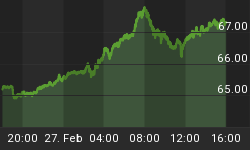Among the many things George W. will go down in history for - whether he wants to or not - is his use of the phrase 'democratic capitalism,' a tag meaningless on its own and intended, we think, to somehow distinguish the doddering but freewheeling US economy from, for example, the robust (but nonetheless 'centrally planned') economy in China.
Yes, word games are fun, but this one completely avoids the point.
Just what is the point?
The point is that the US, once upon a time when the earth was green and your grandparents were a-courting and a-sparking, used to be the industrial engine of the world.
Their economy pumped out things that others wanted to buy, for which the US was rewarded with so much foreign currency they were able to save and re-invest both, without the need to go into debt, or run the printing presses at the mint 24/7.
Nowadays, the experts tell us, the US has a mainly "consumer economy" which, to be frank, is about as meaningful a phrase as the Bush-ism referred to above.
'Consumer economy' is really just a euphemism for a service economy, and a service economy is itself merely a euphemism for a non-industrial economy.
So, stripped of platitudes, the US used to make a lot of stuff. And now they don't.
Which in turn compels us to look more closely that how service providers operate. How they think.
We now know, from decades of empirical evidence, that service providers bring a unique philosophy to their craft. Essentially, their attitude is, and likely always will be, that the fee for the service or value they provide can never be high enough to satisfy them. Coincident to this philosophy - no surprise - we also notice that service providers also believe that there can never be too little competition in any sector they serve; and, indeed, if there were to ultimately be only one large provider left standing in each service niche, well, that's just Jim-Dandy with them.
Want proof? Shall we start with sub-prime and the current impending global depression...
As we have discussed before, the financial sector in the US, never content to be the "tail wagged by the dog," starting creating products and services so perverse, no complex, that NOT ONLY were they able to successfully mystify the oversight bodies charged with watchdogging them (a topic we will return to below) BUT ALSO resulted in profits and revenues to them in many cases greater than the profits and revenues generated by the underlying transactions they were essentially "re-packaging."
[When your father or grandfather purchased his first car, chances are he was sold some form of "undercoating" or "rustproofing" on the deal, and paid between $60 and $150 for the privilege. What he did not know, however, was that the largest portion of that fee went to the salesman, the second largest to the dealer, and the smallest tranche was allocated for the actual application of the product he thought he was buying. Voila - subprime "reductio ad absurdam" to a car dealer scam from the 50s!]
Now, while the rest of the free (and not-not-so-free) world scrambles around trying to undo the subprime mess, it is well worth noting that the core values in the current US economy, described above, have not changed a whit or a jot.
Which is something a lot of commentators are not talking about.
Taking a lead from their cousins in High Finance, the US retail banking sector has lately when toying with the notion that consumers really should pay through the nose for the privilege of parking money with them. (Remember when they gave you a toaster and a hug for opening a new account?)
Wait, it gets better.
The Health Services sector in the US, a sector that has learned to smugly rely on the natural tendency of the human body to develop maladies as it ages, is absolutely determined to make out like a bandit everytime someone, somewhere, catches cold. That incredibly corrupt sector actually breathes new life in the old Vaudeville gag, "Yeah, I'm his agent. If he gets hit by a car and needs a blood transfusion, I get the first 15%."
And the US Communications sector, seeing the trends above, has lately been nosing around the trough, trying to find a way to turn broadband internet into a cash cow, with the current plan being to roll out the equivalent of a "basic cable" package and then surcharge like a maniac for everything else.
By the way, what is especially interesting about the industries we have above highlighted is that these are industries which, prima facie, are supposed to be government-regulated.
Which is, arguably, why we have government in the first place...? To protect citizens from robber barons, thieves, and monopolists.
And so a pattern forms:
* over decades, the US has allowed itself to lose its industrial base and replace it with a small oligopoly of service providers, each of which believes, at its core, that the value-added service it provides is more important than the actual industry it is in, or even the consumers it sells to!
* over decades, Washington has managed to remove almost all major regulations designed to prevent just these sorts of abuses, the recent 'dereg' of the banking & investment matrix being the most astonishing to the naked eye
* over decades, the US consumer has transformed himself from a prudent, penny-pinching, frugal individual -- there actually were entire magazines devoted to 'frugal living' in the 1960s! -- into a "borrow-and-spend" junkie who literally can never have too much credit, too much debt, or too many possessions.
Which brings us to where we are today.
Whether an Obama presidency can resolve this very broad issue is really not the point.
The point is how we got here in the first place, and what we intend to do to fix it.















